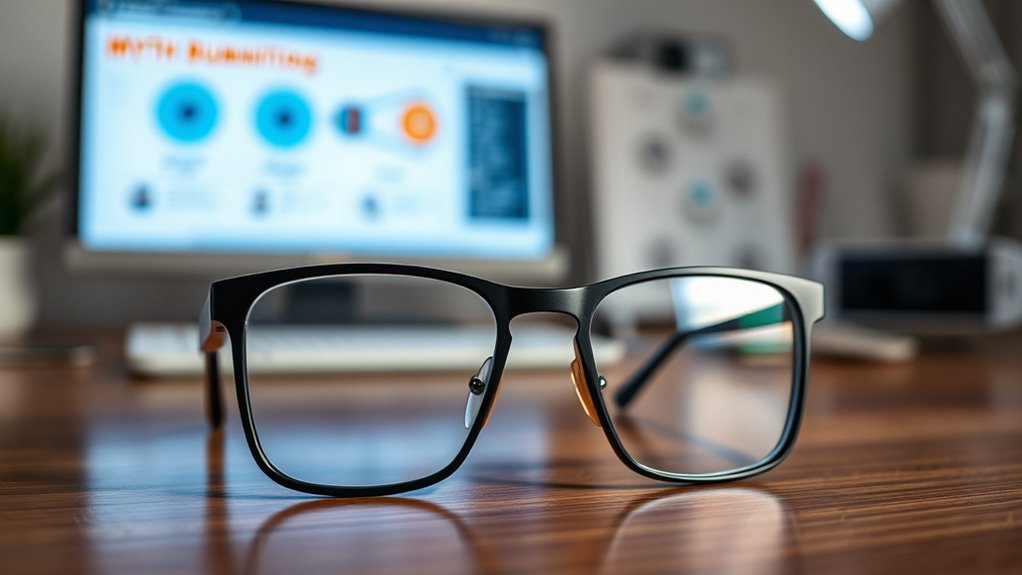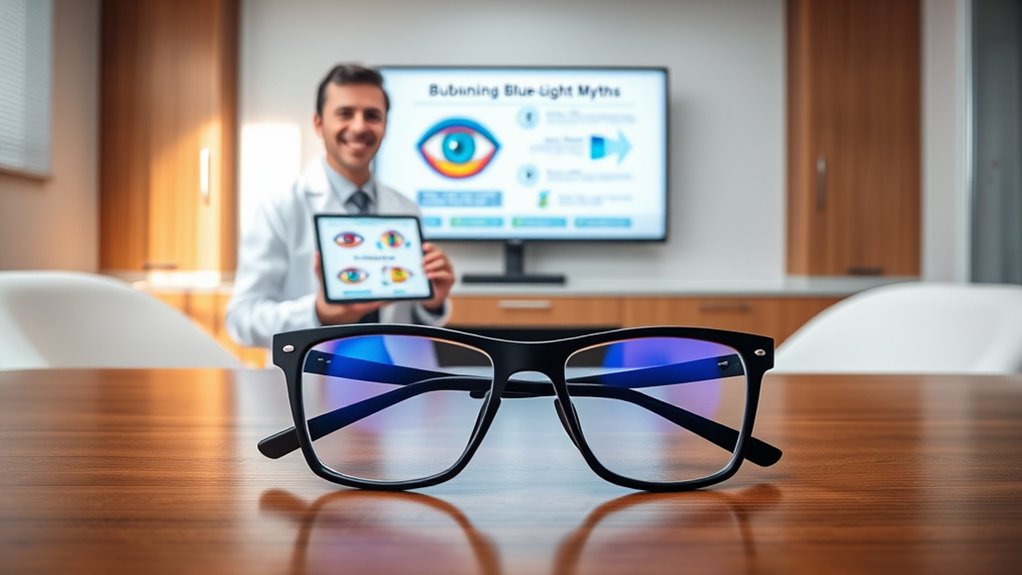Many claims about blue-light blocking glasses are misleading and lack solid scientific backing, according to ophthalmologists. While they may slightly increase comfort for some, they don’t effectively prevent eye problems caused by screens. Factors like glare, poor lighting, and viewing distance play bigger roles in eye strain. Blue light itself isn’t harmful at regular levels, especially during the day. To learn more about what genuinely helps protect your eyesight, keep exploring these common myths.
Key Takeaways
- Blue-light filters offer limited relief for digital eye strain and do not address glare, lighting, or viewing distance issues.
- Blue light exposure from screens is not inherently harmful at normal levels and mainly affects sleep when used at night.
- Ophthalmologists confirm that blue light from screens is not a significant threat to eye health or vision.
- Proper habits like taking breaks, adjusting lighting, and maintaining correct viewing distance are more effective than blue-light blocking glasses.
- Blue-light blocking glasses should be considered supplementary; persistent discomfort requires professional eye care evaluation.

Many claims about blue-light blocking glasses and filters are misleading or exaggerated. While some people believe these products can drastically reduce eye problems caused by screen exposure, the science doesn’t fully support those claims. Instead, it’s more helpful to look at how your screen time habits influence digital eye strain and overall eye comfort. If you spend hours each day staring at screens, you’re more likely to experience symptoms like dryness, headaches, blurred vision, and eye fatigue. But simply wearing blue-light blockers isn’t a magic fix. Eye strain from prolonged screen use results from factors like glare, poor lighting, and incorrect viewing distances, not just blue light itself.
Blue-light blockers may not fully prevent eye strain; habits and ergonomics matter most.
Many people think that blue light is the main culprit behind digital eye strain, but ophthalmologists clarify that the light emitted by screens is not inherently harmful at typical exposure levels. Blue light is naturally present in sunlight and plays a role in regulating your sleep-wake cycle. The concern arises when you’re exposed to it artificially for extended periods, especially late at night. However, current research suggests that blue-light filtering glasses may offer only limited relief for digital eye strain symptoms. They might slightly improve comfort for some users, but they don’t address other contributing factors like improper ergonomics or insufficient blinking, which are common causes of eye discomfort during long screen sessions.
If you want to reduce digital eye strain, focusing on your overall screen time habits is more effective than relying solely on blue-light blocking filters. Take regular breaks following the 20-20-20 rule: every 20 minutes, look at something 20 feet away for at least 20 seconds. Adjust your screen brightness to match ambient lighting and keep screens at an appropriate distance—about arm’s length. Make sure your workspace is well-lit to minimize glare and reflections, which can aggravate eye fatigue. Staying mindful of blinking can also help keep your eyes moist and comfortable. These habits are proven to make a real difference, whereas blue-light filters serve more as a supplementary measure rather than a primary solution. Additionally, understanding the air quality benefits of maintaining good indoor environments can help reduce overall discomfort and promote eye health in conjunction with proper habits.
In the end, the best approach is a combination of good habits and proper ergonomics, rather than relying heavily on blue-light blocking glasses. While they may provide some comfort, they don’t eliminate the root causes of digital eye strain. If you’re experiencing persistent discomfort, it’s wise to consult an eye care professional who can offer tailored advice and check for other issues like dry eye or vision problems. Remember, moderation and proper eye care practices are your most reliable tools for maintaining eye health in a digital age.
Frequently Asked Questions
Do Blue-Light Glasses Improve Sleep Quality Significantly?
You might wonder if blue-light glasses really improve sleep quality. While they can help by reducing blue light exposure, the evidence for significant sleep improvement varies. They may support your circadian rhythm, making it easier to fall asleep, especially if you use screens before bed. However, for best results, combine glasses with good sleep habits like limiting screen time and maintaining a consistent sleep schedule.
Can Blue Light Exposure Cause Permanent Eye Damage?
You might worry that blue light could cause permanent damage, but the truth is, there’s no solid evidence it leads to retinal damage or circadian disruption long-term. While excessive exposure might cause eye strain or discomfort temporarily, your eyes are resilient. Rest assured, blue light from screens doesn’t pose a serious threat of permanent harm, so focus on healthy habits instead of unnecessary fears.
Are All Blue-Light Blocking Products Equally Effective?
You might wonder if all blue-light blocking products work equally well. The truth is, product quality and brand reputation matter a lot. Cheaper or lesser-known brands often use lower-quality materials, which may not block blue light effectively. To get the best protection, choose reputable brands known for quality. Research reviews and certifications, and avoid products that seem too good to be true, ensuring you pick the most effective option for your eyes.
How Does Blue Light Affect Children’S Eye Health?
Think of your child’s eyes as a delicate garden. Excessive screen time exposes their eyes to blue light, which can hinder eye development and cause discomfort. While blue light isn’t the sole threat, prolonged exposure may contribute to digital eye strain and potential long-term issues. Protecting their eyes now helps guarantee a healthy future, so limit screen time and encourage outdoor activities to support ideal eye development.
Is Blue Light Exposure Linked to Digital Eye Strain?
You might wonder if blue light exposure causes digital eye strain. While it can lead to discomfort, it’s mainly linked to prolonged screen time rather than blue light itself. To protect your eyes, focus on UV protection and managing your screen time effectively. Take regular breaks, adjust screen brightness, and consider blue-light filters if needed. These steps help reduce eye strain and promote healthier visual habits during your digital activities.
Conclusion
Don’t fall for the myths—blue-light blocking glasses aren’t a magic fix. Ophthalmologists emphasize that they don’t substantially reduce eye strain or improve sleep beyond normal habits. Did you know that over 70% of people spend more than six hours daily on screens? Staying mindful of your screen time and taking regular breaks is more effective. So, enjoy your digital life, but remember, good habits matter more than special glasses.









